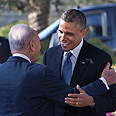
Barack Obama looks at Shimon Peres and sees Israel
צילום: AP
Through Obama's eyes
Op-ed: US president sees Israel as a strong country which must make decisions rather than seek sympathy
In the eyes of many Israelis, President Barack Obama doesn’t really "understand Israel." He is not sensitive and sentimental toward its hardship, he is not filled with love and does not shed tears when Israel is the issue. He is not Clinton or Georg W. Bush. This is nonsense, but one can understand its source: The way Obama perceives Israel is unfamiliar to many Israelis who are soaked in the marinade of their self-image and the uniqueness of their national existence.
The claim that Obama is a great friend of Israel and that his fundamental differences of opinion are exclusively with Prime Minister Netanyahu and his worldview require an explanation too. Obama's unwavering support for Israel on every important and essential matter goes above the heads of many Israelis, and it cannot be dismissed with the claim that for four years they have been exposed to the message from the Prime Minister's Office that "Obama is hostile." He may be hostile toward Netanyahu rather than toward Israel, but the Israeli has fallen for the message.
In fact, it's the same explanation: Obama's image of Israel. In one line: Barack Obama looks at Shimon Peres and sees Israel. He looks at Israel and sees Shimon Peres. When he meets Netanyahu, he meets a disgruntled, angry and demanding Republican senator. Netanyahu may be right, but that's how Obama's sees Israel.
So Obama's remarks at Ben-Gurion Airport on Wednesday, and especially what he said Thursday at the Jerusalem International Convention Center and at President Peres' residence, are essential for the trust Israelis should have in him and his image, as this is a flattering and expanding image rather than an insulting and a diminishing one.
This trust is much more important to Israel than to Obama. Israel has no greater strategic asset than its relations with the US, Israel has no ally like the US, and Israel has no sponsor and provider of a diplomatic and security cover like the US. At a time when the US is close to "energy independence" and is shifting its priorities and interests in its foreign policy to the Far East, the detachment from the Middle East, despite being gradual and slow, is a strategic fact which negatively affects Israel.
Israelis know he's right
Even if they fail to admit it and come up with other political explanations, Obama's great sin in the eyes of many Israelis is that he thinks Israel is a normal country. So Obama's remarks at Ben-Gurion Airport were a sort of recognition of Israel's uniqueness. After all, he would not say those things in Britain or Brazil, as the British are not short of love and do not demand recognition and the Brazilians are not in constant need of attention and support. Obama acknowledges the historical resemblance between the American Republic and Zionism, and derives "uniqueness and moral superiority from it, but not without shortcomings, not with immunity from making tough decisions.Allegedly, a "normalization of the Jewish people's life" is at the foundation of political Zionism. Political sovereignty, independence, convening in a nation state rather than Diaspora and exile is the paramount expression of "normality" in a world built on nation states since the mid 19th century. But Israel's uniqueness and Israel's self-image are such that while striving for "normality," it has a strong desire to remind us and the world's nations that we are not really a "normal" case. We are not Holland, Canada or Japan. We are special and stand out in our difference. We are not just "others," but others with a grim history of persecution and hardship.
And then comes an American president, who is 52 years old, and sees a different Israel. He sees a country of 11 Nobel Prizes, 120 companies listed on NASDAQ, 25% of the world's high-tech ventures, $30,000 GDP per capita a year, the strongest and most technologically advanced army in the Middle East, perhaps only second in the world to the US army. He sees a stable and strong democracy.
From this he concludes – it's a matter of generation and the way one looks at the world – that Israel is a strong, powerful country. A regional power. Yes, it's a bad neighborhood. Yes, there are big threats. Yes, you are real allies. But you're a very strong country. You must make decisions and not just seek love and sympathy.
The Israelis know he's right, but – and that's understandable – don’t like hearing it.










